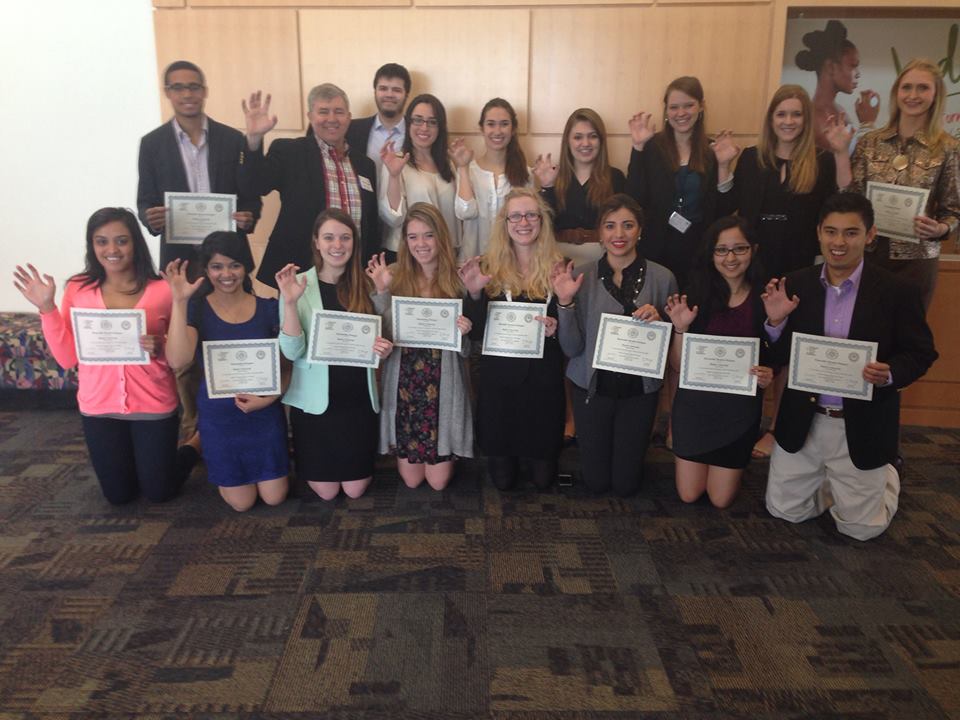Baylor’s Model Arab League Team Successful at Regional Competition

Front row (L to R): Annam Husain, Anuja Mohapatra, Pia Lawrence, Christina Ball, Kristen Gould, Rebekah Stryker, Carina Zuniga and Vinnie del Mundo. Back row (L to R): Carlos Rodarte, Dr. Mark Long, Harrison Humphreys, Hallie Mayer, Lindsay Stanek, Joan Stanton, Rachel Clark, Julia Johnson and Ashley Bergfield. (Courtesy Photo)
Follow us on Twitter: @BaylorUMediaCom
Contact: Lori Fogleman, 254-710-6275
WACO, Texas (April 8, 2014) – Baylor University's Model Arab League (MAL) team won 10 delegate awards – the most for the team in a decade – after participating in the Southwest Model Arab League regional held April 3-5 at Texas A&M University-Commerce.
Representing Tunisia and Yemen, the Baylor team competed against teams from 12 universities from Texas, Oklahoma, Arkansas, Missouri and Louisiana.
Ashley Bergfield, senior international studies and political science major from Boerne, and Anuja Mohapatra, a sophomore international studies major from Round Rock, represented Tunisia on the Special Council on Arab Human Rights and were honored as Outstanding Delegates. Pia Lawrence, senior finance and international business major from Kennett, Mo., and Christina Ball, junior international studies major from Spring, represented Yemen on the Arab Social Affairs Committee and also were named Outstanding Delegates.
In addition, six students were recognized as Honorable Mention Outstanding Delegates: Rebekah Stryker and Kristen Gould, representing Yemen on the Council on Palestinian Affairs; Vinnie del Mundo and Carina Zuniga, representing Tunisia on the Council on Palestinian Affairs; and Carlos Rodarte and Annam Husain, representing Yemen on the Council on Political Affairs. Other team members were Joan Stanton and Harrison Humphreys, representing Yemen on the Joint Defense Council; Rachel Clark and Lindsay Stanek, representing Tunisia on the Council on Political Affairs; and Julia Johnson and Hallie Mayer, representing Tunisia on the Council of Arab Social Affairs Ministers.
"This was an outstanding effort by all 16 members of the team," said the team's faculty adviser Mark Long, Ph.D., associate professor of the Baylor Interdisciplinary Core in the Honors College and director of Middle East studies. "It's important to note that Baylor's Model Arab League team is not a formal class but has met as an extracurricular club. Although there is a faculty sponsor, the students themselves do the recruiting and training, providing every aspect of leadership. They have represented Baylor exceptionally well."
A highly competitive academic activity, the Model Arab League simulates meetings of the League of Arab States. Participating delegations become diplomats for the weekend and represent one of the League's 22 member states in both general and specialized councils. Students draft resolutions addressing the important regional and global issues outlined in an agenda that closely mirrors real-world Arab League issues. The resolutions are debated in moderated council sessions following rules of parliamentary procedure. If passed, these council resolutions are presented to the entire conference during a Summit Session for closing debate and a final vote.
Baylor's MAL team is sponsored by the department of modern languages and cultures and the Middle East studies program. Students Bergfield, Lawrence and Clark provide leadership and training for the team.
"I am extremely proud of everyone who competed at the conference," said Clark, a senior international studies major from Austin, who served as the team's head delegate for Tunisia. "They really took it upon themselves to further their own education. Not only were they willing to do their own research, but many of them, some of whom had never studied the Arab world or knew very little about politics, did a great job of learning on their feet and made allies during the competition. We taught them how to debate and write resolutions and, to the best of our ability, information about some of the countries, but they truly took it upon themselves to do better, and it showed."
The MAL experience is designed to deepen students' knowledge of the history, culture, religion, economics and politics of both their assigned country and the region as a whole. Through active participation in a model, students develop and sharpen skills in debate, consensus-building, critical thinking, parliamentary procedure and public speaking. By arguing the positions and foreign policy objectives of the Arab States, model participants gain personal insights and a meaningful understanding of the issues underlying U.S.-Arab relations.
"Within the Arab world, regimes are constantly changing and we as Americans, let alone well-educated humans, need to know where we stand with the changes happening," Clark said. "Egypt, alone, has had three different rulers in the past three years, each very different from each other. This affects how we trade, who we have political alignment with and our behavior towards the world. There are huge changes happening right now, good and bad, and not just in the Arab world, and we need to know about them."
ABOUT BAYLOR UNIVERSITY
Baylor University is a private Christian University and a nationally ranked research institution, characterized as having "high research activity" by the Carnegie Foundation for the Advancement of Teaching. The University provides a vibrant campus community for approximately 15,000 students by blending interdisciplinary research with an international reputation for educational excellence and a faculty commitment to teaching and scholarship. Chartered in 1845 by the Republic of Texas through the efforts of Baptist pioneers, Baylor is the oldest continually operating University in Texas. Located in Waco, Baylor welcomes students from all 50 states and more than 80 countries to study a broad range of degrees among its 11 nationally recognized academic divisions. Baylor sponsors 19 varsity athletic teams and is a founding member of the Big 12 Conference.